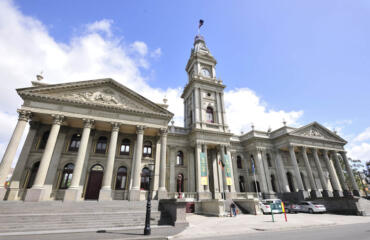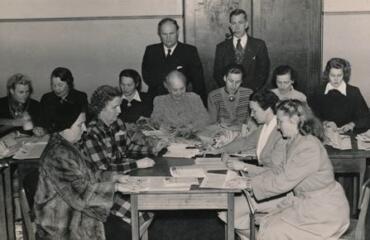
It’s about jobs, jobs and more jobs: James Purcell reporting for duty. PIC: Scott Tibballs
James Purcell is his own man; beholden to no one, but coveted by many.
Since his surprise election to the Victorian Upper House last November, the Port Fairy accountant and former mayor has been far more popular than his primary vote of 5621 would suggest.
“As the numbers have fallen,” he tells The Citizen on a meal break in a bustling parliament house, “everybody wants a piece.”
That’s not just the honourable members of the Andrews Government, but also the myriad interest groups from around the state who see value in getting onside a potential power-broker of the Legislative Council.
It’s a strong position in which to find himself, admits Mr Purcell, who has been kept busy by the flattering approaches.
“It would be a very easy – but less rewarding – life if we didn’t hold the balance [of power]. As just a party of one . . . you can’t delegate.”
Without any party colleagues in the chamber, the 62-year-old father-of-three and grandparent must pedal hard to keep abreast of everything. There’s no friend to tap on the shoulder to get the low-down, a fact he laments after being summoned to a vote mid-interview.
“We have no ideas of grandeur, or candidates all over the state. We’re local.” — James Purcell,MLC
The name of Mr Purcell’s party, Vote 1 Local Jobs, speaks to his single-mindedness, and those wishing to approach the parliamentary newbie will need to be mindful of his election platform: it’s about jobs, stupid – specifically, jobs in western Victoria – and those having something good to say about job creation are more than likely to have his ear. Otherwise, Mr Purcell and his former running mate cum deputy/co-executive/assistant/staffer/advisor Tanya Waterson, are likely to be less accommodating.
Western Victoria is a vast electorate, and while most voters would imagine it a mainly rural rump, it is represented mostly by major party MLCs who reside in the regional centres of Geelong and Ballarat, almost on Melbourne’s doorstep.
In fact, Mr Purcell is the only member of the Victorian Parliament west of Ballarat who is not in opposition and, as a cross-bencher, is arguably in a better position to negotiate goodies for the people of his own district than any government member sitting alongside him in the chamber.
Despite representing a political party that is only a few weeks older than his claim to a Victorian parliamentary seat, Mr Purcell is not new to politics, having stepped down from his position as a Moyne Shire Councillor to take up his seat in Victoria’s capital.
The former mayor has his head around pretty much everything to do with the shire, which wraps itself around Warrnambool and takes in the towns of Port Fairy, Mortlake and Kororit, having spent 13 years as its director of business and tourism before being elected to the council in 2008, and again in 2012. In fact, he was its mayor twice, in 2010 and 2014.
But his bid for a seat at a bigger political table came suddenly. Vote 1 Local Jobs was registered with the Victorian Electoral Commission just four weeks ahead of the state poll, at which Mr Purcell managed to snare the fifth and final seat for the Western Victoria Region. It’s an achievement you would be hard-pressed to find replicated anywhere across the Australian political landscape.

All the more impressive is Mr Purcell’s claim that “we’re entirely self-funded”. He and Ms Waterson say they received no money from donors, which affords the new member latitude to do as he pleases and campaign on issues he considers important, rather than being left to toe the line of pushy donors.
“We don’t owe unions anything, or big business anything,” he declares with satisfaction.
Nor did Mr Purcell win his seat by relying on the likes of the Minor Party Alliance and its founder Glen Druery, the architect of complex preference deals that have helped propel unknowns into parliament on wafer-thin voter support. Instead, he brokered any deals himself, with preference swaps made with a plethora of parties active in the region – Family First and the Democratic Labour Party, to name a couple.

Ms Waterson said that Vote 1 Local Jobs was ranked highly by all parties across the spectrum, a reflection of the effort devoted to negotiations by Mr Purcell, who pushes a modest barrow of policies that would likely be palatable to capital city voters as much as to those in the bush.
On investment in renewable energy, Mr Purcell is very supportive, but only as long as power generation “is in the appropriate place” geographically: to wit, the gusty western shores of his electorate and those of neighbouring South Australia.
“Renewable energy sources like wind, solar, wave, anything like that — they’re always in the right location.”
The ructions that dogged Canberra on where Australia stands with the Renewable Energy Target are a source of angst for rural communities that depend on investment from a booming industry, adds Mr Purcell.
“In our neck of the woods there’s 10 or 15 [wind projects] . . . there’s probably five that are built. There’s somewhere around $5 billion worth of investment waiting for the RET [in Western Victoria]. A number of those will get built. If they come out with the right number [for the RET] there’ll probably be another five built in our term.”
While Canberra’s recent bipartisan pledge lowered the RET from 44,000GWh to 33,000GWh, the Victorian Government is maintaining its campaign for retaining control of the state’s ultimate renewables goal, a philosophy that could help pay dividends in Mr Purcell’s sprawling bailiwick. Sorting out the targets, he says, has been critical in returning confidence to the sector, with investment able to start flowing again to the regions. The higher the RET, the better, he argues.
Despite wanting the RET to be federally-based, Mr Purcell is keen for the states to do their bit as well. After all, there was a Victorian RET before there was a federal one, he says, so the Victorian government can step in to ensure the sector continues to grow.
The Premier recently re-stated the government’s desire to introduce a Victorian scheme, hot on the heels of Mr Purcell’s parliamentary question of May 6: “Will [the Government] create a more secure future for the industry through the establishment of a Victorian renewable energy target?”
Observing from the gallery high above the Legislative Council chamber, it’s not hard to notice the change in the tone of government ministers whenever they address one of the five cross-benchers during Question Time. You might almost accuse them of being civil.
But it is a civility that Mr Purcell hopes will pay off ultimately for his cause and his constituents.
With a basic policy of ensuring all investment proposals emanating from Vote 1 Local Jobs are offset by savings elsewhere, he nominates the Australian Grand Prix as a target for cuts.
“Not enough value in it,” he insists bluntly. At $50 million a year, it’s the perfect sacrifice for a policy focusing on western Victoria.
“In our neck of the woods there’s 10 or 15 [wind projects] . . . there’s probably five that are built. There’s somewhere around $5 billion worth of investment waiting for the RET [in Western Victoria].” — James Purcell, MLC
“[The roads] in western Victoria are the worst in the state . . . There’d be about $220 million needed to bring them up to the quality of those in northern Victoria or eastern Victoria. Not better, but as good as.
“So I said: ‘Right, we need $200 million, and one of the things I don’t think we get good value out of is the Grand Prix’.”
Another race on Mr Purcell’s mind is steeple chasing. As a businessman who owns horses, he’s unsurprisingly a supporter. Yet, his own recreational interests are not the only reason he backs the sport. He tells The Citizen that the money that the Grand Annual brings into western Victoria makes if effectively “bigger than Christmas”.
“The jobs that that creates [are] . . . significant.”
Capital city critics wouldn’t understand the significance of the tradition that is jumps racing, he adds. The Grand Annual, after all, is a public holiday in that neck of the woods.
Likewise, the parliamentarian’s voter base is very local. Of the 5621 Victorians who gave him the nod, 2699 were from the Lower House electorate of South-West Coast – the seat of former premier Denis Napthine and Mr Purcell’s own back yard.
Of the other 10 Lower House electorates contained within the Upper House region, Vote 1 Local Jobs failed to break 500 votes in any, polling an average of about 300 votes per electorate. That equated to just 1.28 per cent of all votes cast in the region.
But in the quirky nature of Upper House voting, Mr Purcell, with the help of Family First and the DLP, managed to edge out the Greens to take the final seat in Western Victoria.
With minor parties increasingly grabbing a share of the political limelight, courtesy of the electoral system, Mr Purcell is mindful of the implications of his own success. He doesn’t altogether reject the major parties’ push to alter the electoral system to prevent the likes of his success.

“The system needs to be changed, but not because it’s uncomfortable for the major parties,” he tells The Citizen. “If they’re doing it for democratic reasons, that’s fine. If not, it’s the worst thing that could happen.”
The current system allows anyone who can fashion the right alliances to snare a seat, he says. And now that minor parties have figured that out, upper houses around the country stand to become ever more colourful – until the big parties change it.
Vote 1 Local Jobs is arguably a different political animal, Mr Purcell seems to infer.
“We have no ideas of grandeur, or candidates all over the state,” he says. “We’re local.”
He refuses to build alliances with other parties that he fears could compromise his own positions. Ms Waterson adds simply that her party colleague doesn’t make alliances at all.
This attitude should make Mr Purcell an interesting player for government and opposition alike as the current parliamentary term unfolds. So far, they’ve been more than happy to negotiate with the jobs advocate.
Mr Purcell says he has “never been knocked back” when requesting meetings with government ministers, recounting the time he entertained hopes of meeting an unnamed minister within a fortnight and was told “not tomorrow, but the day after”.
That implied position of strength is exactly what he sought for western Victoria by standing in November. And it seems to be exactly what he has got. Now, the challenge is to see what he can make of it.



